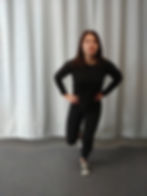Your Hips Don't Lie! Glute Medius and Hip Abductor Strengthening

Hip abductors are a group of muscles located on the lateral side of the hip which allow sideways movement. One of the main muscles which comprise of this group is the gluteus medius which is one of three gluteal muscles. Research has been conducted to observe and determine the best exercises for these muscles, which will be demonstrated in this article.
A societal trend in increased sitting down due to office jobs and leisure has been thought to be a major reason as to why so many people have weak gluteal muscles and hip abductors. Impaired hip strength has been associated with numerous musculoskeletal injuries or disorders such as patellofemoral syndrome, knee injuries including anterior cruciate ligament (ACL) injuries, low back pain and hip pain.
(Image: Muscolino, Joseph. Right Gluteus Medius Lateral View, "Gluteus Medius - Its true function" 29 January 2009. https://learnmuscles.wordpress.com/2009/01/29/gluteus-medius-its-true-function/ accessed 18th September 2018)
The following examples are a few simple exercises which can be done easily throughout the day and at home can help to increase hip abductor and gluteus medius strength and function to prevent the onset of some of the above-mentioned injuries.
Please note that if you experience any pain or discomfort while performing these exercises, do not persist with it and consult a health professional for appropriate management and guidance.
BEGINNER EXERCISES
Studies looking at the muscle activation during different glute medius exercises have helped determine which exercises are most efficient. The exercises below are aimed at beginners who have not specifically trained these muscles before or are getting started with muscle specific resistance training.
Side Lying Hip Abduction
This exercise is great for identifying the gluteus medius and hip abductor muscles as a starting point. Lie on your side with your legs together and straight. You can rest your head on your hand or on the ground. Using the side of your hip, lift your leg to the roof in a controlled manner and bring it back down. Start with 10 repetitions for 3 sets, for both sides.


Forward Lunge
This exercise will not only help strengthen the hip muscles, but also the other gluteal muscles, hamstrings and quadriceps. Start with your feet together and hands on your hips. Take a step forward and lunge and lower yourself towards the ground. Push back up and return to the starting position. Do this process again, but with the opposite leg. Complete this for 20 repetitions for 2 sets as a guide.


Lateral Banded Walk/Crab Walk (Resistance band or hip circle band required)
This exercise requires a light to moderate resistance band. Place the band just above your knees. With slight flexion in both the hips and knees, take a step to the side and bring your feet together. Complete 10 steps going in one direction and then take 10 steps back to the starting position. Complete this sequence 3 times. You should feel this on the sides of your hips and in your glutes.


Clam Shells
Lie sideways on the ground and propped up on your elbow. Bend your knees to make a 45-degree angle and make sure to keep your hips in a vertical line when completing this exercise. Keeping your feet/heels together, lift your top knee away from the ground in a slow, controlled manner, and bring it back down to return to the starting position. This exercise should be completed for 10-15 repetitions, for 3 sets. If it becomes to easy, a resistance band can be added just above the bent knees.


INTERMEDIATE EXERCISES
These next few exercises are aimed at people who are previously trained in resistance training, compete in sport, or have completed the beginner exercises and they have become too easy.
Single Leg Squat
This is similar to a normal squat but requires more hip abductor strength as a balance element is added. It is not necessary to reach full depth during this exercise. It is more important to get to a point where you are most comfortable and complete the exercise in a controlled manner. Starting on one leg, bend into a squat position until it becomes too challenging. Return to the starting position and complete this exercise 10 times on each leg for 2 or 3 sets.


Single Leg Deadlift
Not only is this exercise good for hip abductor strength, it is great for developing balance which helps reduce falls during the later years in life. Starting on one leg, let the back leg travel behind you and hinge at the hips. Make sure to keep the spine in a neutral position. Reach down towards your feet with your hands and then return to the starting position. It is normal and beneficial to feel a slight stretch in the glutes and hamstrings. Complete 10 repetitions on each leg for 3 sets. Once bodyweight becomes too easy, dumbbells can be added in each hand to increase resistance and make it more challenging. Make sure to gradually increase the weight and not increase too quickly.


References
1. Freiwald J, Baumgart C, Kühnemann M, Hoppe M. Foam-Rolling in sport and therapy – Potential benefits and risks. Sports Orthopaedics and Traumatology. 2016;32(3):258-266.
2. Prins M, van der Wurff P. Females with patellofemoral pain syndrome have weak hip muscles: a systematic review. Australian Journal of Physiotherapy. 2009;55(1):9-15.
3. Uhl T. Electromyographic Analysis of Hip Rehabilitation Exercises in a Group of Healthy Subjects. Journal of Orthopaedic and Sports Physical Therapy. 2005;.
4. Distefano L, Blackburn J, Marshall S, Padua D. Gluteal Muscle Activation During Common Therapeutic Exercises. Journal of Orthopaedic & Sports Physical Therapy. 2009;39(7):532-540.
![Inv-100619 (4) [Converted] (1)1024_1 - p](https://static.wixstatic.com/media/afd327_da91abf7e06c4f3dbde4194c4827c1d8~mv2.jpg/v1/fill/w_395,h_123,al_c,q_80,usm_0.66_1.00_0.01,enc_avif,quality_auto/Inv-100619%20(4)%20%5BConverted%5D%20(1)1024_1%20-%20p.jpg)




















